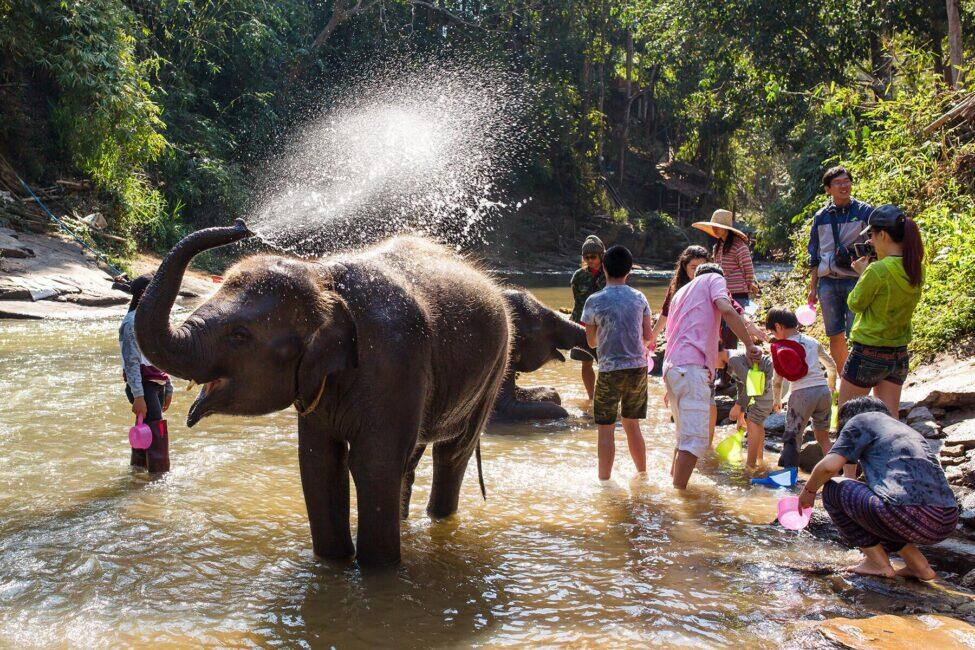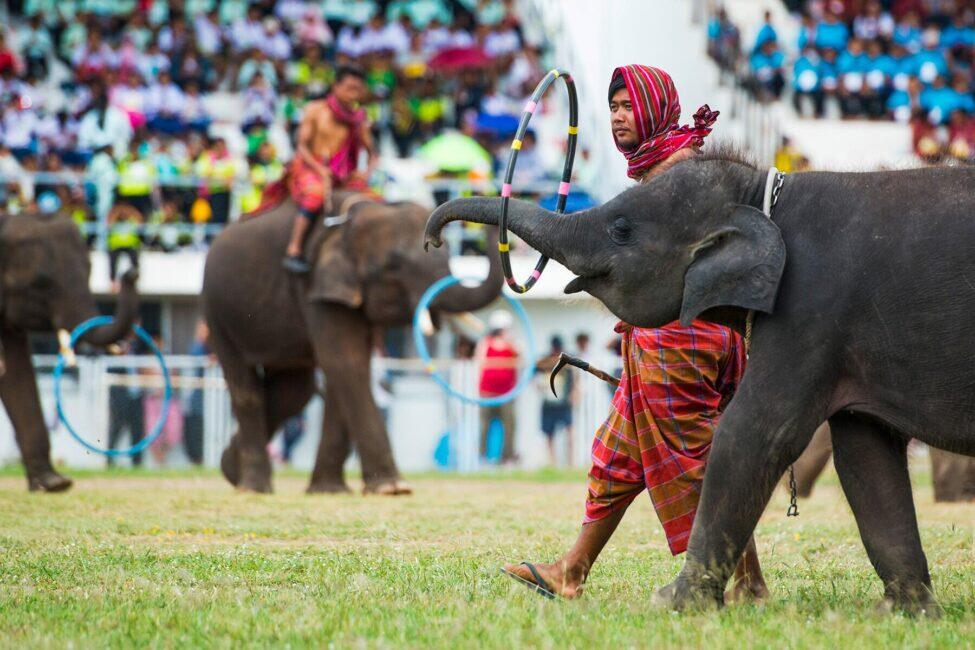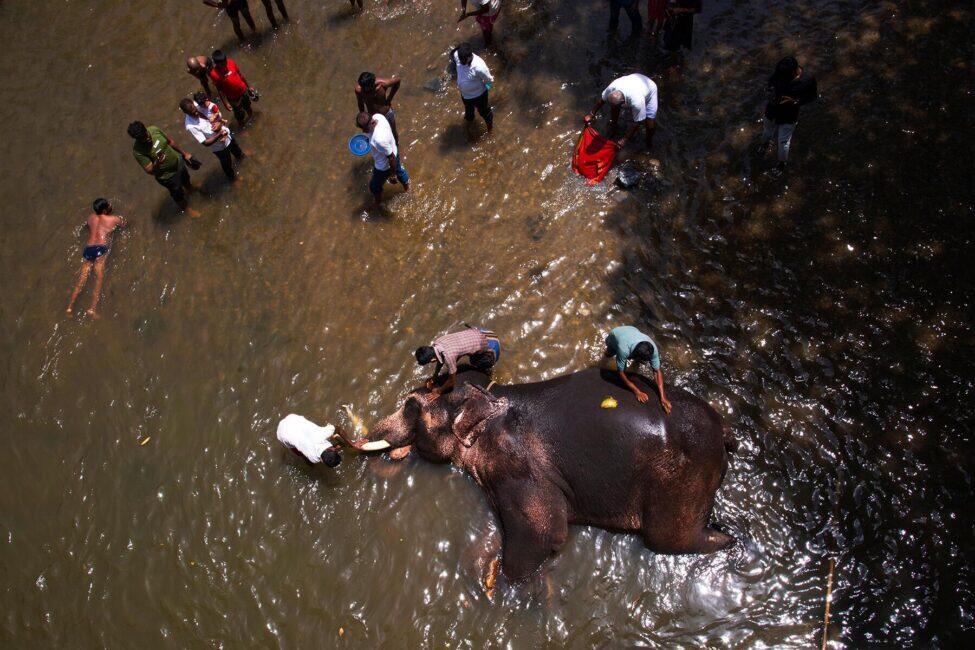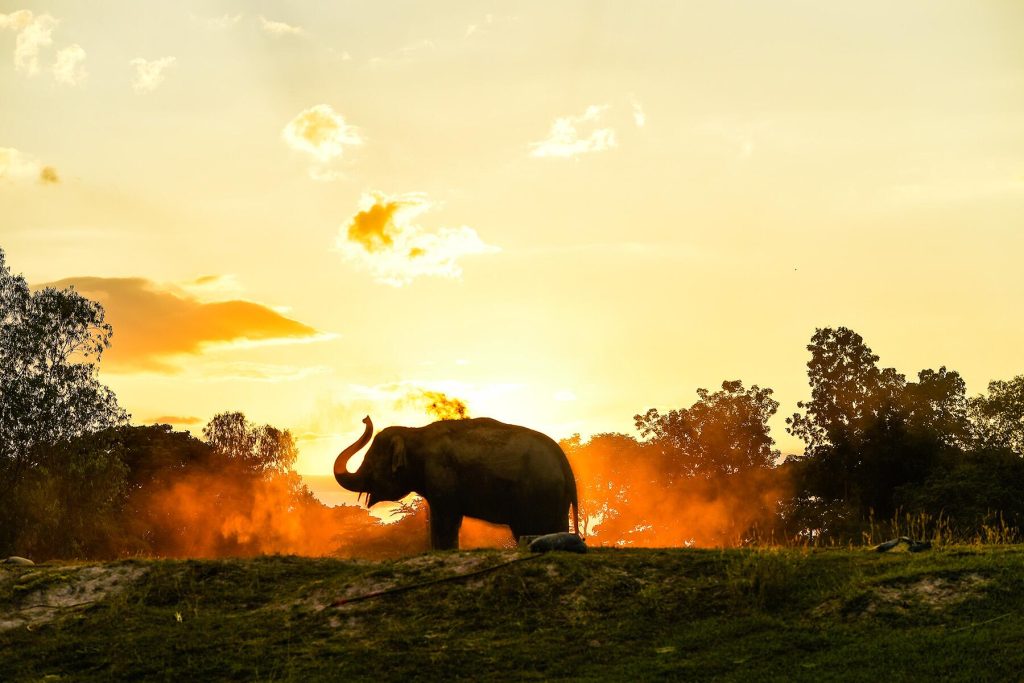An increasing number of travel companies are putting a stop to this harmful practice.
Travel companies are discontinuing unethical encounters with elephants. Carnival Corporation is the latest to ditch elephant rides, bathing, and feeding. “Carnival Corporation previously sold excursions that offered direct contact experiences, mainly in Indonesia and Sri Lanka,” Emily Guice, People for the Ethical Treatment of Animals (PETA) Corporate Responsibility Officer, says. “Every major travel brand that cuts ties with exploitative elephant encounters helps push the entire tourism industry to move away from this cruelty.”
Carnival Corporation is the world’s largest cruise line, operating Carnival Cruise Line, Princess Cruises, Seabourn, and other brands. “We only use tour operators whose companies pay close attention to elephant welfare,” a Carnival Corporation spokesperson told Fodor’s.
In 2014, Intrepid Travel was the first global tour operator to remove rides on the endangered animals. Since then, over 100 other travel companies (including Fodor’s, Airbnb, Costco Travel, Expedia Group, G Adventures, and EF Go Ahead Tours) have stopped promoting or offering exploitative encounters with elephants.
“Supporting unethical facilities by purchasing rides helps sustain the demand for more captive elephants and cruel training techniques. Tourists can play a vital role in the phase-out of elephant exploitation,” Valerie Taylor, the executive director of Global Federation of Animal Sanctuaries (GFAS) says.
Taylor explains that elephant rides aren’t the only harmful hands-on activity. “Bathing and hand-feeding aren’t in the best interests of the animal and potentially threaten the animal’s health due to the risk of disease transmission,” she says.
Continue Reading Article After Our Video
Recommended Fodor’s Video
Travel companies have a responsibility to review their elephant offerings and ensure they’re not supporting establishments that exploit elephants. GetYourGuide banned elephant riding, but not bathing, hand-feeding, and touching. Tripadvisor ceased selling tickets for elephant rides in 2016, but still lists elephant rides with a “does not meet animal welfare guidelines” disclosure.
Similarly, sister company Viator has tours that allow hand-feeding. “A listing on Tripadvisor doesn’t represent an endorsement of the business or its animal welfare practices. We don’t remove listings from the platform, but we don’t sell tickets to experiences that don’t meet our animal welfare guidelines,” a Tripadvisor spokesperson told Fodor’s.
Nearly 4,000 elephants are tourist attractions in Asia. Sixty-three percent of captive elephants are suffering in severely dire conditions, and only 7% are kept in high-welfare establishments. “When tourists support these unethical businesses, they support the illegal wildlife trade industry, forced breeding programs, injuries from rides, and performances of unnatural activities like painting and dancing,” Diana Edelman, a former marketer for an elephant sanctuary in Thailand, says.

According to World Animal Protection (WAP), 75% of captive adult elephants used for entertainment were taken from the wild. Of those, 5% to 30% of elephants die during capture and training. “Elephants are taken from the wild—often as very young calves—separated from their mothers, and subjected to cruel training methods designed to ‘break’ their spirits, which can involve beatings, confinement, starvation, and psychological trauma,” Meghan Verbeek, product manager for wildlife at Intrepid Travel, says.
Breaking an elephant—known as “the crush”—requires horrific abuse of elephant calves. Elephants are beaten repeatedly to control them through fear. They’re confined in tiny structures, starved, bound with ropes, and beaten with nail-studded sticks and bull hooks until they’re submissive. “I saw the aftermath of the crush in Myanmar. The young elephant had gashes all over her, a chunk of skin missing from her trunk, and pink scars around her ankles from chains,” Edelman says. Elephants can develop C-PTSD from the crush.
Any elephant used for direct-contact activities must be made submissive. This includes elephant bathing, hand-feeding, and photo opportunities, which are often viewed as harmless activities in comparison to riding elephants but cause just as much suffering. When they’re not performing for tourists, captive elephants are usually kept chained and constantly threatened with bull hooks. PETA’s video from a Thai tourist attraction shows handlers waving weapons around elephants’ heads to “keep them fearful and anxious enough to be used for rides,” Guice explains.

By paying for hands-on activities, tourists are directly funding the vicious cycle of elephant abuse. It’s a cycle of exploitation that Verbeek believes most tourists participate in out of admiration for elephants—not because they support cruelty.
“Hand-feeding often means elephants are eating the wrong food, such as high sugar fruits, rather than foraging on natural food. It can cause dependence, aggression, and health problems,” Jemma Bullock, Elephant Valley Project’s deputy director, says. Verbeek adds that tourists “often feed elephants bananas or sugarcane, which can contribute to obesity and metabolic disorders similar to type 2 diabetes.”
These experiences endanger the safety of tourists, mahouts (elephant caretakers), and elephants. Performing for humans can cause stress in captive elephants, which may result in deadly incidents. “No amount of abusive training can guarantee that a wild animal won’t protect themselves when they feel threatened. Direct contact with elephants is dangerous, unpredictable, and can be fatal,” Guice says. When a 22-year-old Spanish tourist was killed while bathing an elephant in Thailand, the mahout was charged with negligence resulting in death.
“Elephants are often forced into repeated bathing sessions to entertain guests, disrupting their natural behavior and causing stress. Only trained mahouts should go into water with an elephant,” Bullock says. Bathing has become such a popular alternative to riding that WAP found in Thailand (where animal abuse is illegal), elephant washing activities have tripled in the last five years.

There’s no third-party accreditation for attractions that claim to be sanctuaries. Patrons must look beyond the taglines of “sanctuary,” “refuge,” “rescue center,” “conservation project,” and “orphanage” to determine if an elephant experience is truly ethical. These illegitimate elephant sanctuaries deceive well-meaning tourists with carefully crafted marketing jargon.
Legitimate elephant sanctuaries are purely observational, with strict hands-off policies that include no riding, bathing, swimming, hand-feeding, or touching; they prioritize animal welfare over human amusement. Instead, they allow visitors to observe elephants in a natural habitat from a distance that’s safe for both elephants and humans. “Ethical animal tourism is simply observation; otherwise, they’re still captive working elephants,” Edelman says. Guice agrees, noting that “any business that allows direct contact with elephants is a sham and not a sanctuary, no matter what it calls itself.”
Visit highly vetted elephant refuges and conservation centers around the world. Tourism Cares recommends the Kindred Spirit Elephant Sanctuary in Thailand. WAP recommends ChangChill, Boon Lott’s Elephant Sanctuary, and Mahouts Elephant Foundation in Thailand. In Cambodia, they vouch for Elephant Valley Project, and in Nepal, Tiger Tops. In Kenya, the David Sheldrick Wildlife Trust is an elephant orphanage where individuals can make a $50 annual donation to “adopt” an elephant. Stateside, PETA recommends The Elephant Sanctuary in Tennessee and the Performing Animal Welfare Society.

